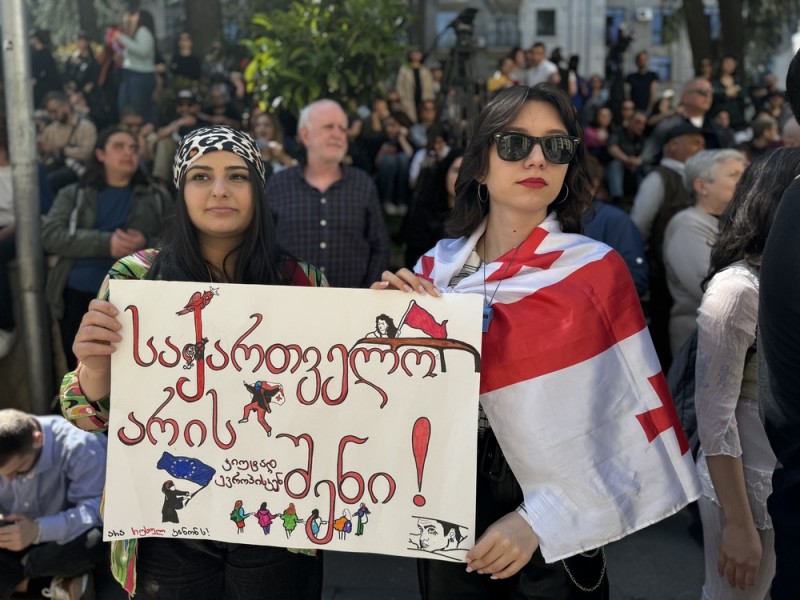The law is far from being adopted. It still needs to go through two more hearings and a review by the Legal Issues Committee before being sent to the president for signing into law.
At each of these stages, there is potential for it to be blocked. However, if approved, the bill would mandate that non-governmental organizations and opposition media outlets receiving funds from abroad register as agents of foreign influence, subjecting them to government scrutiny.
Thousands of Georgians gathered on Monday outside the Parliament building to oppose the adoption of what they refer to as the “Russian law,” linking it to Russia's notorious Foreign Agent Law, which has been used to suppress independent voices.
Protesters carried banners reading: “No to Russia, Yes to Europe!” and “No to the Russian Law.” Some mocked the claims by supporters of the law that it had no resemblance to the Russian legislation.
“It is not Russian law … and other hilarious jokes you can tell yourself,” one banner said.
Inside the building, lawmakers engaged in the same battle seen months ago when the draft was first proposed but escalated it this time.
“No matter how sensational it may seem to someone, it's not a Russian law. I agree with you, a Russian law will not be accepted in Georgia. Nor will slavery at the same time,” said Mamuka Mdinaradze, the bill's initiator and a lawmaker from the ruling Georgian Dream Party, before opening the discussion on Monday and presenting the law's content.
This prompted opposition lawmaker Aleko Elisashvili to rise and punch Mdinaradze in the head. Chaos ensued as other lawmakers joined the fight or attempted to break it up.
Elisashvili was quickly removed and addressed the media outside the building.
“For the sake of Georgia, come out!” he urged. “They will send us to Russia. There is no other narrative here. They will send us to Russia, and we must not go there,” he said, emphasizing the opposition’s view that this law signals a dangerous step towards aligning with Moscow.
Monday’s session lasted 11 hours, as did Tuesday’s. On Wednesday, opposition lawmakers walked out as the voting began. The remaining MPs, all members of the ruling party, voted in favor of the draft.
Police detained a total of 25 people on Monday and Tuesday, using pepper spray against protesters and assaulting journalists, according to local media. The crowd remains in front of the building.
Grigol Gegelia, a member of the political council from the opposition Lelo party, told OCCRP reporters outside the building that his party would stand against any attempt to strengthen Russia’s influence in the country.
"Georgian Dream serves Russia and its interests, and they will undoubtedly try to execute this directive…. We will fight unwaveringly and to the end, not only against this law, but also against this Russian regime, which has waged a hybrid war against its own nation,” he said.
Another protester, Nestan Tsetskhladze, editor of the independent Georgian media outlet “Netgazeti,” told OCCRP that her reporters were prevented from entering the hearing.
“They fear journalists and independent media, free people, and that's why they are pushing for this law… I am certain that reintroducing this law not only endangers civil society and the media but also threatens every citizen of Georgia,” she said.
“Even after this brutal crackdown, people remain steadfast and oppose the Russian law. There will be no Russian law in this country!” said Elene Khoshtaria, chairwoman of the political party “Droa.”
The bill’s discussion also drew international outrage.
Michael O'Flaherty, Commissioner for Human Rights of the Council of Europe, sent a letter last week to the chairman of the Georgian Parliament, Shalva Papuashvili, criticizing the draft.
“I am concerned about the compatibility of this legislative initiative with the human rights standards in the field of freedom of association and expression, including the chilling effect its adoption may have on the work of media outlets and civil society organizations, in particular those working on human rights, democracy and the rule of law in Georgia,” he wrote.
Papuashvili responded, asserting that the draft law would have a positive impact on Georgian NGOs.
“The draft law will raise the level of responsibility and accountability of NGOs. Thus, their legitimacy, which was shaken due to scandals with meddling in politics, will increase. So will the trust towards them among the public,” he wrote.
In December last year, Georgia was granted EU candidate status by the European Council.
EC President Charles Michel reminded Georgians on Tuesday of their choice of the European path.
“Let me be clear: the draft Law on Transparency of Foreign Influence is not consistent with Georgia’s EU aspirations and its path to accession. It will take Georgia further away from the EU, not closer,” Michel wrote on X.



